Congressman McGovern adresses the Bahrain issue

Tom Lantos Human Rights Commission
Friday May 13, 2011
Human Rights in Bahrain
Congressman Jim McGovern
&
Panel I:
- Mr. William J. Burns, Under Secretary for Political Affairs, U.S. Department of State
- Mr. Jeffrey D. Feltman, Assistant Secretary, Bureau of Near Eastern Affairs, U.S. Department of State
Panel II:
- Maryam Al-Khawaja , Bahrain Center for Human Rights
- Mr. Joe Stork, Deputy Director, Middle East and North Africa Division, Human Rights Watch
- Richard Sollom, MA, MPH, Deputy Director at Physicians for Human Rights (PHR)
Congressman McGovern started the hearing by emphasizing on the fact that Bahrain is indeed a friend, but does not deserve a pass on human rights issues.
The hearing was enriched with formal statements from Amnesty International, AFLCIO, and Doctors Without Borders and other organizations.
Mr. Joe Stork, Deputy Director, Middle East and North Africa Division, Human Rights Watch:
Mr. Stork explains how now it’s a critical time, and there is a strong counter-narrative effort by the Bahraini government. Bahrain is trying to make it so that democracy is equated with terrorism. Detainees are political prisoners, and are kept hidden from their own family members and lawyers.Only international reporter in Bahrain was kicked out of country last week. Human Rights Watch turned away at airport, and even Joe Stork is personally banned from Bahrain. Mr. Stork explains that the credibility of US is being questioned.
At the end of his testimony, Mr. Stork makes a few recommendations:
- Stork recommends cutting commercial & security assistance to Bahrain, specifically riot gear, tear gas, & other crowd suppression tools.
- Stork recommends that that the US speaks about specific issues, otherwise they will undermine human rights efforts in Bahrain.
- The Obama Administration needs to call out on officials by name and be specific.
Maryam Al-Khawaja , Bahrain Center for Human Rights:
Ms. Khawaja elaborates on her first hand experience as a Bahraini throughout the recent events and she explains how the Al Khalifa government has been targeting Sunnis who protest with special ferocity to prevent any other Sunnis from joining the anti government protests, and democracy seeking movements. She also mentions the fact that the government denies having prisoners that they have publicly arrested. She shares the data gathered from the protestors which includes that over 400 students were expelled, dozens of staff were unlawfully terminated. scholarships revoked for any protesting the Bahraini government.
To conclude her testimony, Ms. Khawaja suggests the following as necessary steps to ease the stressful situation in Bahrain:
- Use the relationship between the United States and Bahrain to calm down the situation in Bahrain. If the situation remains unstable, people of Bahrain will seek any help that they can get, and although unfortunate and definitely and the solution people want, but Iran will be the first solution in hand. She reassures that Iran’s presence in Bahrain is not what people want.
Richard Sollom, MA, MPH, Deputy Director at Physicians for Human Rights (PHR)
Mr. Sollom, the Deputy Director at Physicians for Human Rights Solomon addresses the Bahraini issue through his organization’s interest, and he suggests that the United States Government officials should visit Bahrain, especially Sulaymania hospital, the most advance and best equipped hospital in Bahrain, and then they would realize what is going on in Bahrain. Mr. sollom also suggests that a new UN mandate for violations of medical neutrality needs to be formed.
Mr. Sollom also points out that as a expert in this issue, it is wrong to see that more than six physicians were arrested, tortured and abused purely because they are doing a humanitarian job, and saving lives! He furthermore explains that high velocity weapons are used at such short distance and that’s just inhumane.
Mr. Sollom also describes her visit to the Sulaymania hospital and he recalls that event because it has been so shocking for him. Mr. Sollom and few of his colleagues approach the hospital in a car, and suddenly notice that there is a military tank parked outside the hospital and faces the entrance of the hospital. As they get closer to the hospital, they notice that there were at least two dozens of military officers whom were divided into officers wearing blue which he assumed are Saudi Arabia forces, and rest were obviously Bahraini national guard. Mr. Sollom and his colleagues were arrested, and interrogated for an hour, and finally let go unharmed, but definitely shocked by what they had witnessed.
Mr. Sollom believes that physicians have been arrested, taken forcefully to the sixth floor of the Sulaymania hospital, tortured and forced to face the camera and mention that they work for the Iranian government, and they were also tortured to face the camera and mention that they were trained in Iran, hence they are there trying to corrupt the Bahraini government.
Questions presented by congressman Jim McGovern, in the Tom Lantos Human Rights Commision:
Congressman McGovern: Has the Bahraini Government inquired and investigated the abuses?
Mr. Sollom: Such Inquiries have never been materialized
Congressman McGovern: what do you say about allegations that Bahrain Center for Human Rights is instigating the Violence in Bahrain?
Ms. Al-Khawaja: The center only investigates and reports on human rights violations.
Mr. Stork: the government has banned the group and seized their assets.
Congressman McGovern: Bahraini Government says that human rights groups are unrestricted in Bahrain!
Mr. Stork: Absolutely not true!! This idea is not from reality.
Congressman McGovern: Ms. Al-Khawaja, please tell us about the Shia-Sunni relations !
Ms. Al-Khawaja : My best friend is a Sunni Bahraini, and we, people of Bahrain, do not have any problems or disagreement within themselves except the fact that this what the kingdom of Bahrain is doing is wrong. Unfortunatly government has been able to spin the issue into a sectarian issue. I have recommended that the State Department take urgent action.
She also adds that she has personally seen tear gas and rubber bullet canisters that said “Made in the USA-Pennsylvania.”
Congressman McGovern: tell us about the destruction of mosques by Bahraini Government :
Mr. Stork: Human Rights Watch was kicked out of Bahrain when they started investigating.
Congressman McGovern asks the panel for their final comments :
Mr. Sollom: There is a difference between torture and beating, and Bahraini government is engaging in torture in hospitals according to corroborated testimony. There are police was videotaped beating, torturing, and forcing physicians and doctors for false confessions.
Ms. Al-Khawaja : Regarding the Human Rights situation, it is going from bad to worse. I have been begged to ask for protection for innocents.
Mr. Strork: while focus is on Bahrain, what US says or doesn’t say, does or does not do, has implications of the situation in Bahrain.
Congressman McGovern: our focus is on human rights, not supporting or opposing one side. US is late to the game for speaking out against violations. We urge the government to take the comments seriously and earnestly.
Congressman Jim McGovern ( representing 3rd district of Massachusetts )
ISWF among the reporters and humanity organizations
From right to right to left:
- Right : Mr. Joe Stork, Deputy Director, Middle East and North Africa Division, Human Rights Watch
- Middle : Maryam Al-Khawaja , Bahrain Center for Human Rights
- Left : Richard Sollom : dupity director at Physicians for Human Rights
Maryam Al-Khawaja and ISWF: discussing the sectarian issue, role of Saudi and Iran in this issue, and ISWF’s full support for people of Bahrain:
Richard Sollom and ISWF: discussing the severity of tortures done to doctors in Bahrain
Joe Stork, a reporter, and ISWF talking about the role of human rights watch, and Mr. Stork being banned from entering Bahrain





